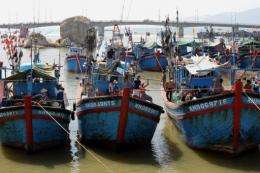Banned antibiotics in Asian fish imports: Australia

Australian officials are seeing a rising number of Asian fish imports containing banned antibiotics, a report said Wednesday.
Five consignments of fish from Vietnam have been stopped by authorities this year because they contained enrofloxacin, an antibiotic barred in Australia, official figures show.
This compares with three loads of fish from that country stopped last year for the same reason.
The Melbourne Age said experts were concerned that increasing amounts of seafood contained the chemicals, which are used in the growing or feeding of aquaculture fish to reduce the occurrence of disease.
"The trend that we see with fish, and it's generally about antibiotics, is that they are very low levels of residues but they are there nonetheless," Narelle Clegg, from the agriculture department's food safety branch, told the paper.
While fish imports, including basa fillets and frozen fish cutlets, were stopped from Vietnam because of antibiotics, it was not the only country providing affected food.
China, France and Italy were among many source nations shipping food which failed to meet Australian standards, the newspaper said.
Its analysis of public records showed that since 2010, some 1,050 imported foods had not made the grade -- with some 400 foods stopped at the border because of micro-organisms such as E. coli.
Others contained banned additives or contaminants, or failed chemical analysis.
Most likely to fail the Australian tests was Chinese food, followed by products from India, Italy, Japan, South Korea and France, it said.
Experts said antibiotics were a concern even at a low level as they can lead to the evolution of resistant strains of bacteria in both fish and humans.
"If you are taking them into your intestine, they could have some effect on your own (bacteria) in your bowel and it can leave your own bacteria that used to be sensitive to antibiotics resistant," Peter Collignon from the Australian National University told the paper.
(c) 2012 AFP

















